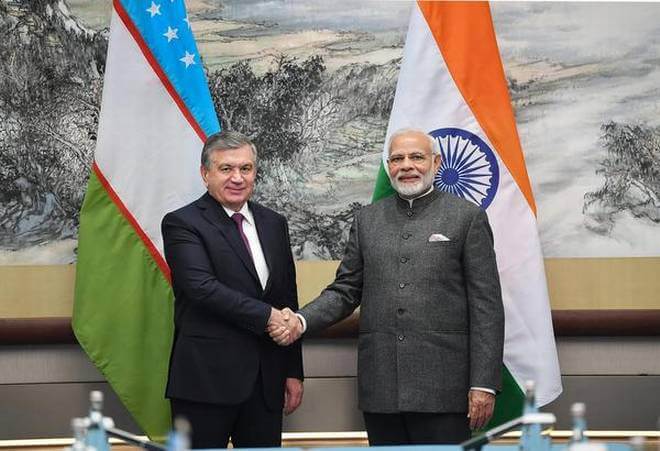On December 11, Indian Prime Minister Narendra Modi and Uzbek President Shavkat Mirziyoyev convened for a virtual meeting. Consequently, the two sides signed nine agreements to strengthen their bilateral partnership on several issues such as “new and renewable energy, digital technologies, cybersecurity, community development projects and sharing of information on the movement of goods.” The Indian Ministry of External Affairs (MEA) also released a statement confirming the approval of a $448 million Line of Credit for several infrastructure and development projects in Uzbekistan. This was a part of the $1 billion Line of Credit announced by India in 2018.
Moreover, the two premiers spoke of taking tangible steps towards the finalisation of a bilateral investment treaty between the two countries. The two sides released a joint statement saying, “The leaders agreed that both sides should work towards an early conclusion of Bilateral Investment Treaty which shall facilitate investment promotion and protection for further improvement of trade and economic cooperation.” Furthermore, the officials from both countries were urged to conduct studies to pave the way for negotiations of a Preferential Trade Agreement.
During his opening statement at the summit, Prime Minister Modi addressed the importance of the peace process in Afghanistan for both countries. He added, “We also have a similar approach on regional security issues. We agree that the restoration of peace in Afghanistan requires a process that itself is led, owned and controlled by Afghanistan. It is also necessary to preserve the achievements of the last two decades.” In the joint statement, both sides acknowledged the significance of peace in Afghanistan for the security and stability of the region and expressed their support for a “united, sovereign and democratic Islamic Republic of Afghanistan.”
According to the joint statement, one of the prime focuses of the discussion was the importance of countering terrorism “in all its forms and manifestations” and the need to crack down on “terrorist safe-havens, networks, infrastructure and funding channels.” They agreed to work towards ensuring that their territories are not used as breeding grounds for terrorist activities against each other. Consequently, Modi and Mirziyoyev agreed on expediting discussions on a Comprehensive Convention on International Terrorism.
The two leaders also discussed the importance of improving connectivity between the two countries, specifically in light of their larger goal to boost bilateral trade. Consequently, the Indian side urged Uzbekistan to join the International North-South Transport Corridor (INSTC), which is a “7,200-km-long multi-mode transport project for moving freight among India, Iran, Afghanistan, Armenia, Azerbaijan, Russia, Central Asia and Europe.” Following the discussion, while addressing the media, the Indian MEA’s Joint Secretary (Eurasia) Adarsh Swaika confirmed that Uzbekistan had agreed to join the INSTC in principle.
As a result of their mutually agreed-upon commitment to expediting connectivity projects, India accepted Uzbekistan’s proposal to hold a trilateral discussion between the two countries and Iran. The trilateral meet will be chaired by deputy ministers of Iran and Uzbekistan and will be attended by an MEA Secretary from India.
This discussion, which is scheduled to be held on Monday, will primarily focus on the Chabahar port, which is a port being jointly developed by India, Iran and Afghanistan. Currently, India has control over one of the port’s terminals, which it had previously developed. The port is particularly important for India to bypass Pakistan and access several countries in Central Asia.
The significance of the Chabahar port also featured in India’s statement following Friday’s summit wherein the Indian side highlighted its importance and recognised it as a prospective “fulcrum of connectivity to Central Asia.” Further, the statement said, “India welcomes the interest of Uzbekistan to use the Chabahar port as a transit port. This would open up economic opportunities for the traders and business community of the region … Besides Uzbekistan, other central Asian countries have also shown interest in using the port. India seeks to cooperate closely with regional countries on this issue.”
India, Uzbekistan Sign 9 Pacts Following Virtual Summit
After a virtual meeting between Indian Prime Minister Narendra Modi and Uzbek President Shavkat Mirziyoyev, the two sides agreed to collaborate on several issues including counterterrorism.
December 14, 2020

Indian Prime Minister Narendra Modi and Uzbek President Shavkat Mirziyoyev at the sidelines of the Shanghai Cooperation Organisation Summit in 2018. SOURCE: PTI
